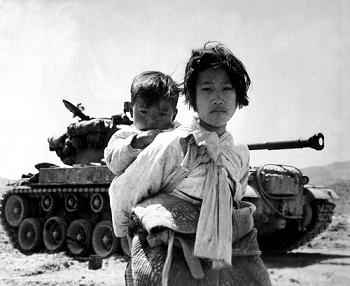VIDEO: The US rather than North Korea is a Threat to Global Security
US Military confirms that 20% of North Korea's Population was Killed during Korean War

North Korea lost thirty percent of its population as a result of US led bombings in the 1950s. US military sources confirm that 20 percent of North Korea’s population was killed off over a three period of intensive bombings:
“After destroying North Korea’s 78 cities and thousands of her villages, and killing countless numbers of her civilians, [General] LeMay remarked, “Over a period of three years or so we killed off – what – twenty percent of the population.”1 It is now believed that the population north of the imposed 38th Parallel lost nearly a third its population of 8 – 9 million people during the 37-month long “hot” war, 1950 – 1953, perhaps an unprecedented percentage of mortality suffered by one nation due to the belligerance of another.”
During The Second World War the United Kingdom lost 0.94% of its population, France lost 1.35%, China lost 1.89% and the US lost 0.32%. During the Korean war, North Korea lost 30 % of its population.
These figures of civilian deaths in North Korea should also be compared to those compiled for Iraq by the Lancet Study (John Hopkins School of Public Health). The Lancet study estimates a total of 655,000 Iraqi civilian deaths, following the US led invasion (March 2003- June 2006).
1. Richard Rhodes, “The General and World War III,” The New Yorker, June 19, 1995, p. 53.
Michel Chossudovsky, Global Research, 12 October 2006
North Korea has announced it will sever all ties and communication with the South in retaliation for what it calls a smear campaign over the sinking of a South Korean warship in March.
US Secretary of State Hillary Clinton has arrived in Seoul for talks on the escalating row.
An international investigation has found that Pyongyang fired the torpedo which sank the warship, killing 46 sailors.
South Korea has called on the UN Security Council to impose new sanctions on its neighbor.
Pyongyang has also threatened military action against the South, claiming Seoul’s navy trespassed into the disputed waters of the Yellow Sea.
An international investigation found that Pyongyang fired the torpedo which sank the warship, killing 46 sailors.
Michel Chossudovsky, the head of the Center for Research on Globalization, an independent Canadian think tank, argues that North Korea is more prey than a predator.
“North Korea is portrayed in the international media as a threat to global security, but there is absolutely no evidence to that effect. On the other hand, North Korea is the only country in the world that has lost up to a quarter of its population in recent history [during the Korean War, when the North Korean population was wiped out by US bombings],” Chossudovsky told RT.

